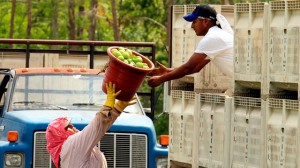We’re proud to collaborate with The Nation in sharing insightful journalism related to income inequality in America. The following post appeared first in Nation contributor Greg Kaufmann’s “This Week in Poverty” blog.
(CIW) honored at the Roosevelt Institute’s Four Freedoms Awards on Wednesday night. Having followed the organization’s work for seven years, I believe their effectiveness is unmatched, and their achievements constantly offer a reason for hope.
The CIW way is non-hierarchal, led from the grassroots, fearless and savvy — and they have defeated Goliath so many times that they can no longer be considered a David. I think many community-based and national anti-poverty organizations can learn a lot from them.
The Four Freedoms Awards honor those who exemplify Franklin D. Roosevelt’s vision of democracy — “a world founded upon four essential human freedoms” — freedom of speech, freedom of worship, freedom from want, freedom from fear. Past recipients include President Jimmy Carter, Senator Ted Kennedy, Studs Terkel, Barbara Ehrenreich, Elie Wiesel, Nelson Mandela, the Dalai Lama, Aung San Suu Kyi and Carlos Fuentes. The farmworkers were introduced by Roosevelt Fellow Dorian Warren, who outlined some of CIW’s key campaigns and victories.

Farmworkers pick tomatoes at Taylor & Fulton Tomatoes in Immokalee, Fla. (AP Photo/Luis M. Alvarez, File)
Although they won raises of 13 to 25 percent — resulting in an increase of several million dollars annually for the community –they still earned well below the poverty line. The group realized that the real power was with the corporate buyers whose constant demand for lower tomato prices exerted significant downward pressure on farmworker wages. In 2001, the CIW launched its Campaign for Fair Food — forging an alliance between consumers and farmworkers — and initiated the first-ever national boycott of a major fast food chain: Taco Bell.
Students, people of faith, workers and community members demanded that Taco Bell pay an extra penny per pound of tomatoes, which would go directly towards workers’ wages. They also called on the corporation to take responsibility for its supply chain and only purchase from growers who signed an enforceable code of conduct that addressed human rights violations in the fields — violations such as involuntary servitude and sexual harassment.
After four years of struggle, Taco Bell agreed to the demands and called on other fast-food chains to do the same. Over the next three years, McDonald’s, Burger King and Subway all followed suit. Today, Wendy’s remains the only holdout. The CIW turned its attention to the supermarket industry and won similar agreements with Whole Foods and Trader Joe’s (Publix, Giant, Kroger and Stop & Shop still aren’t on board) in the food service provider industry. Bon Appétit Management Co., Compass Group, Aramark and Sodexo all signed fair food agreements in 2009–10.
In 2010, the Campaign for Fair Food evolved into a broader Fair Food Program — a new model of social responsibility. In addition to abiding by the penny-per-pound agreement — which has resulted in over $11 million in additional earnings for workers since January 2011 — corporate buyers who sign on will purchase tomatoes only from growers who sign a code of conduct drafted by workers, in consultation with the growers and buyers. There is also worker-to-worker education on the new rights and workers monitor their own workplaces.
Under the agreement, the Fair Food Standards Council conducts regular audits, investigates complaints and monitors resolutions at the twenty-six participating growers — growers who account for 90 percent of the $650 million in revenues in the tomato industry. When major violations occur and aren’t corrected, corporations stop buying from those growers. (This model is similar to the one US retailers have refused to sign onto in the Bangladesh garment industry.) Through this system, four crew leaders with long histories of sexual harassment or labor abuse have been terminated and supervisors at those companies were trained to address sexual harassment and other requirements under the Fair Food Program.
“With this program, the women who pick tomatoes to support their families no longer have to leave their dignity in the tomato fields,” said farmworker Nely Rodriguez, who accepted the Freedom From Want Medal along with fellow-CIW members Gerardo Reyes and Greg Asbed. “Women now have a voice and a way to stop the harassment and abuse that happened for too long.”
Finally, there is the CIW’s stunning anti-slavery campaign: since 1997, the group has assisted the Department of Justice in uncovering numerous multi-state slavery operations in the southeastern US. This work has resulted in the liberation of over 1200 workers and was a major factor in the passage of the Trafficking Victims Protection Act. The US State Department recognized the CIW as “an independent and pressing voice as they uncover slavery rings, tap the power of the workers and hold companies and governments accountable.” Now, with the Fair Food Program and the severe financial consequences for growers that are imposed when forced labor is discovered, Florida has evolved from what one federal prosecutor described as “ground zero for modern-day slavery” to having no cases of slavery over the past three years.
Asbed spoke of the special significance of the Freedom from Want Medal in the context of the organization’s history.
“Twenty years ago when we began organizing, Immokalee was a town defined by violence,” he said. “Violence against women, beatings in the fields, modern day slavery — it was a brutal and unforgiving place.”
The farmworkers began to gather every week in a room at Our Lady of Guadalupe Catholic Church in town. They would pass around the UN Universal Declaration of Human Rights — the preamble of which included FDR’s Four Freedoms.
“This book gave us hope that a better world, a more humane world, was in fact possible,” said Asbed. “[It] gave us the strength we needed to fight to make that world real. So being here today feels a bit like coming home, like our journey has come full circle.”
It’s a journey that shows us what it means to work directly — from the grassroots — with those most affected by poverty; what it means to set a seemingly unreachable bar and persevere and what it means to understand your opposition and find new ways to challenge it.
Asbed insisted that the CIW’s “work has only just begun.”
“Our work is not done until all farmworkers live free from want,” he said. “Until all farmworkers live free from fear and until all farmworkers live free to enjoy the dignified life they deserve for the hard work they do.”


